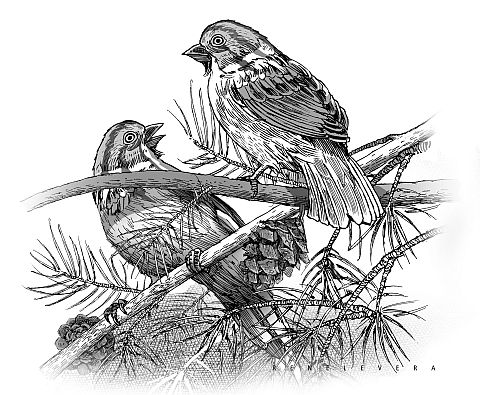
Once, while Henry David Thoreau was hoeing in a garden, a sparrow alighted on his shoulder. As is the wont of little birds, it stayed there only for a moment, and then flew away. Thoreau considered it a greater honor to have the bird than any epaulet on his shoulder. (An epaulet is an ornamental shoulder piece on a military uniform.)
The small brown and gray house sparrow hangs around patios, gardens and backyards, especially churches. Incidentally, but for the fact that the sparrow does not sing, I was about to remark that Shakespeare might have this bird in mind too, when, in one of his better-known sonnets, he wrote about the cold, bare ruined choirs of an abandoned monastery, against which branches with no leaves, or with just a few leaves, all yellow, shake up and down, possibly under the weight of the noisy, playful bird.
What might have pushed the sparrow into alighting on Thoreau’s shoulder? Birds are naturally skittish. But the hungry ones forget their timidity when they see food. At St. James Park in London, the wife and I saw how without any hesitation birds came to rest on the open palms of a man, to peck at the birdseed he had put there.
But feeding the sparrow does not seem to be then in Thoreau’s agenda. He was hoeing the garden, having decided to lead a rustic life. He had vowed to maintain himself “thus solely by the labor of my hands.” He had found out that “by working about six weeks in a year, I could meet all the expenses of living.” This was in accordance with his desire “to live deep and suck out all the marrow of life… to drive life into a corner, and reduce it to its lowest terms.”
Now the last thing that a bird will alight on is a moving man with no whiff or trace of birdseed on his body. And if the man wields a hoe, the bird will definitely avoid him for being, what the enforcers of the law would call, armed and dangerous.
But Thoreau claimed that a sparrow did land on his shoulder, and this he regarded as a singular honor.
Sometimes I doubt if a sparrow really settled on Thoreau, and wonder if he was not speaking figuratively, metaphorically, and was just using the sparrow as a vehicle to drive home his message — the need for one to simplify one’s life.
But then the incident could have actually happened. And if it did it was probably error for the sparrow to have done what it did. (Which could explain the briefness of its stay on Thoreau’s shoulder.) It was in any case a bad feather day for the sparrow. Either the bird had, because of its youth, become listless, or else it had missed its desired destination — the branch of a tree that Thoreau might have cut down the day before for firewood and to have the space which he was now hoeing — and in its bewilderment the sparrow just might have settled for the next best thing, Thoreau’s shoulder.
And yet, perhaps, there was no error. Certainly, not in the divine scheme of things. With God there can be no miscalculation or blunder. “Are not two sparrows sold for a penny?” asked Jesus. “Yet not one of them will fall to the ground apart from the will of your Father.”
Whether it erred or not, the sparrow rested on Thoreau for a reason, not Thoreau’s — for the incident even surprised him — but God’s.
And God’s reasons are infinitely deeper, wider, higher than any of our reasons.
If Thoreau only made up the tale about the sparrow alighting on his shoulder, God, who reads man’s mind, would still have known of it, and this would not, in any way, disprove what Jesus had said in the Gospel of Matthew. That the sparrow should fall on Thoreau’s shoulder would still be God’s will, no matter if He had allowed it to happen only in a story.
Disclaimer: The comments uploaded on this site do not necessarily represent or reflect the views of management and owner of Cebudailynews. We reserve the right to exclude comments that we deem to be inconsistent with our editorial standards.
